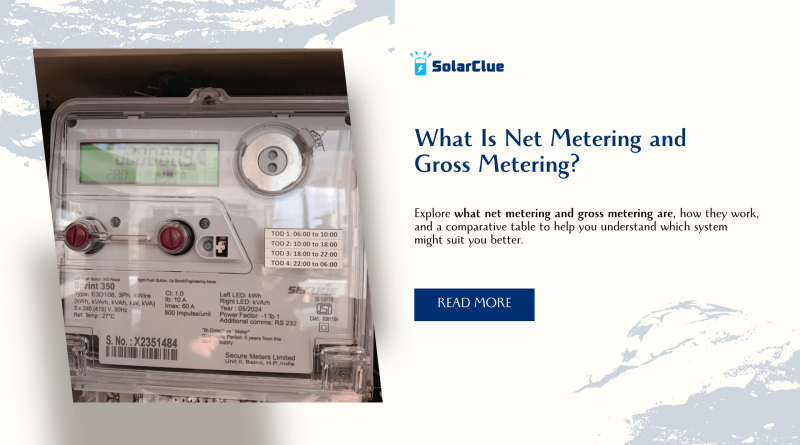What Is Net Metering and Gross Metering?
With the rising adoption of renewable energy, particularly solar power, homeowners and businesses are seeking ways to make their energy investments more financially viable. Two popular billing mechanisms—Net Metering and Gross Metering—offer solar energy users a way to sell excess energy back to the grid. While both systems allow for energy generation and potential savings, they function differently and come with distinct advantages.
In this blog, we will dive into what net metering and gross metering are, how they work, and a comparative table to help you understand which system might suit you better.
Table of Contents
What is Net Metering?
Net Metering is a billing mechanism that allows solar energy users to feed the excess electricity generated by their solar panels back into the grid. In return, they receive credits that can offset their future electricity bills. This system works as a “net” balance between the energy you consume from the grid and the energy you generate and export.
How Net Metering Works:
Energy Consumption: You consume the energy generated by your solar panels first. Any extra energy needed beyond what your solar system produces is drawn from the grid.
Energy Export: If your solar panels generate more electricity than you need (usually during peak sunlight hours), the excess electricity is exported to the grid.
Billing: The utility company calculates the difference (or net) between the energy you imported from the grid and the energy you exported. If you exported more energy than you consumed, you earn credits that can offset future electricity bills.
Example of Net Metering:
If you consume 600 kWh from the grid but your solar system produces 400 kWh that you send back to the grid, your net consumption is 200 kWh. You would be billed only for those 200 kWh.
What is Gross Metering?
Gross Metering is a billing mechanism where all the electricity generated by your solar power system is exported directly to the grid. Unlike net metering, where your generated energy first powers your home or business, gross metering sends 100% of the electricity to the grid, and you are compensated at a predetermined feed-in tariff.
How Gross Metering Works:
Energy Export: All the electricity generated by your solar system is sent directly to the grid. None of it is consumed by your home or business.
Energy Consumption: You consume electricity from the grid separately, and you are billed for the total amount of grid electricity you use.
Billing: The utility pays you for the energy you export based on a fixed tariff rate, but you still pay for any energy you consume from the grid. These two are treated as separate transactions.
Example of Gross Metering:
If your solar panels generate 500 kWh and you export all of it to the grid, you get paid for 500 kWh at the feed-in tariff. Separately, if you consume 600 kWh from the grid, you are billed for the full 600 kWh at the regular retail rate.
Key Differences Between Net Metering and Gross Metering
To understand which system might be better for you, let’s compare net metering and gross metering across several key parameters:
| Feature | Net Metering | Gross Metering |
|---|---|---|
| Energy Usage | First powers your home, then exports surplus | All energy generated is exported to the grid |
| Billing Mechanism | Net of energy consumed from and exported to grid | Separate billing for grid consumption and export |
| Compensation | Credits for excess energy at retail rates | Compensation for total export at feed-in tariff |
| Consumption from Grid | Only for excess energy when solar is insufficient | 100% grid dependence for consumption |
| Feed-in Tariff | Not applicable (credited based on retail rate) | Predetermined by utility (often lower than retail) |
| Best For | Residential users with variable consumption | Large commercial or industrial systems |
| Savings Potential | Greater, due to credits offsetting electricity bills | Limited, depends on feed-in tariff rates |
| Complexity of Installation | Simple with bi-directional meter | Requires separate export and import meters |
Pros and Cons of Net Metering
Pros:
1. Higher Savings: Since you offset your electricity bills with the energy you generate, net metering offers more direct savings for homeowners.
2. Simple Setup: A bi-directional meter tracks both energy consumption and export, making it easier for utility companies and users to monitor.
3. Incentivizes Energy Efficiency: Since you are compensated for excess energy exported, it encourages users to be more efficient with their energy use.
Cons:
1. Limitations in Some States: Some states are capping net metering benefits or phasing it out for large systems, especially commercial ones.
2. Limited Compensation for Surplus: If you generate more energy than you consume regularly, the credits you receive might not fully compensate for the system’s cost.
Pros and Cons of Gross Metering
Pros:
1. Separate Billing: Gross metering provides clear separation between the energy you produce and consume, making it easier to track financial returns.
2. Fixed Tariff for Export: You receive a consistent and predictable feed-in tariff for all the energy you export, making financial forecasting simpler.
3. Ideal for Large Systems: Businesses and industries with high consumption can export all their solar energy while meeting their own needs from the grid.
Cons:
Lower Compensation: Feed-in tariffs are usually lower than retail electricity rates, meaning you may earn less for the energy you export compared to net metering.
No Direct Bill Offset: Since you don’t consume the solar energy you generate, your electricity bills remain based on grid consumption.
Which is Better: Net Metering or Gross Metering?
The choice between net metering and gross metering largely depends on your energy consumption patterns and financial goals.
Net Metering:
Best for homeowners or small businesses that can consume the solar energy they generate.
It’s more suitable if you want to reduce your electricity bills directly and if your consumption aligns with solar generation.
Higher savings potential as you get credits at retail electricity rates, which can completely offset your bill if your system is properly sized.
Gross Metering:
Best for large commercial or industrial setups where you want to treat solar energy as an additional revenue stream.
You sell all the energy you generate at a fixed rate and buy electricity from the grid for consumption.
Works well in areas where the feed-in tariff is attractive and stable over the long term.
Conclusion
Both net metering and gross metering offer solar energy users a way to reduce energy costs, but they cater to different needs. Net metering is ideal for homeowners and small businesses looking to directly offset their electricity bills by using their own solar energy. On the other hand, gross metering works well for larger commercial systems where generating revenue from solar power is a primary goal.
By understanding the differences between these two billing mechanisms, you can make an informed decision on which one aligns best with your energy goals and consumption habits.
Ready to Save on Electricity Bills with Solar Power?
With Net Metering, you can drastically reduce your electricity costs by generating your own solar power and sending any excess back to the grid. It’s time to harness the sun’s energy and make a positive impact on both your wallet and the environment!
At SolarClue, we make the transition to solar simple, efficient, and affordable. Whether you’re a homeowner, business, or institution, our team of solar experts will guide you through the process—from installation to maintenance—so you can start saving from day one.
🌞 Take the first step towards energy independence today!
🔋 Get your solar consultation now!
Contact SolarClue or call us at +91-888-4444-830 to explore the best solar solutions for your home or business.
Go Solar. Save More. Power Your Future with SolarClue!
FAQs
1. Can I switch between net metering and gross metering?
This depends on your state’s policies and your utility provider. Some states allow you to switch, but it may require a new metering setup.
2. Which system is better for residential users?
Net metering is generally more advantageous for residential users because it allows for direct bill savings by offsetting grid consumption.
3. What happens to my solar credits in net metering if I don’t use them?
Unused solar credits are often carried forward to the next billing cycle. Some states allow the credits to accumulate for up to a year.
4. Is gross metering available in all states?
Not all states or utilities offer gross metering. It’s more common for large commercial or industrial installations.
5. Can I earn money with either system?
With net metering, you can reduce your electricity bills, and in some cases, receive compensation if you export more than you consume. In gross metering, you are paid for every unit of electricity you export at a fixed rate.




